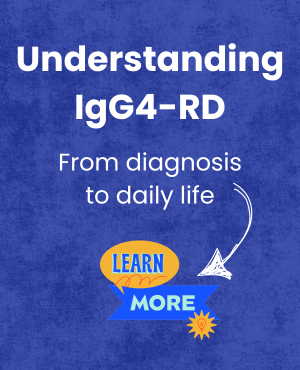
After an IgG4-related disease diagnosis: What to expect
Last updated June 2, 2025, by Susie Strachan

Receiving a diagnosis of IgG4-related disease (IgG4-RD) can feel overwhelming, especially if it’s taken months — or even years — to reach this point.
Perhaps you’ve seen multiple specialists, been through tests that didn’t quite explain what was happening to you, and even been misdiagnosed with another condition.
Now that you finally have a name for your disease, you might feel a mix of relief, confusion, and worry about the future. You’re not alone if you’re still trying to wrap your head around what this means for your health and day-to-day life.
Fortunately, there are steps you can take to feel more in control, including building a care team, managing your medications, prioritizing your mental health, and connecting with others.
Understanding your diagnosis
IgG4-RD is a progressive condition caused by your immune system becoming overactive, leading to inflammation and scarring (fibrosis) in one or multiple parts of the body, including the pancreas, salivary glands, kidneys, bile ducts, and other organs.
In fact, between 60% and 90% of people with IgG4-RD are diagnosed with multiple organ involvement.
Because symptoms can be vague, such as fatigue, weight loss, pain, or painless swelling, it can take months or years to reach a correct diagnosis.
It’s not unusual for a diagnosis to be a process of eliminating other conditions, including cancer, infections, or other autoimmune diseases.
Coming to terms with your diagnosis
Learning that you have a rare, chronic illness can bring up emotions such as shock, confusion, frustration, and grief. You might find it difficult to explain your diagnosis to others, as IgG4-RD symptoms can sometimes be “invisible” to those around you.
It’s OK to feel uncertain about how the disease may change over time, or how IgG4-RD treatments may affect your body.
Therapy or counseling may be beneficial as you work through your feelings. Stress, in particular, can heighten symptoms for some people, so tending to your mental health can be just as important as managing your physical health when living with IgG4-RD.
Building a care team and treatment plan
Along with your primary care provider, and depending on which organs are affected, your IgG4-RD care team may include a mix of health specialists, such as:
- rheumatologists
- gastroenterologists
- endocrinologists
- nephrologists.
Pathologists and radiologists may also be involved in reviewing your test results and biopsy findings.
Your treatment plan will be unique to your situation. Your care team may start you on medications that calm your immune system and reduce inflammation, such as corticosteroids or immunosuppressive therapies.
You may also have regular blood work (such as IgG4 levels or organ function tests), imaging, or follow-up visits to monitor for flares — periods when the disease becomes more active, causing increased inflammation and symptoms in your affected organs — and your response to treatment.
Don’t be afraid to ask questions:
- Why is this the recommended treatment?
- What are the possible side effects of taking corticosteroids?
- How long will I need to stay on my medications?
And if something doesn’t feel right, seeking a second opinion is OK.
Lifestyle adjustments
Making small changes in your daily life can help with managing IgG4-RD symptoms and reducing flare-ups.
For many people with IgG4-RD, fatigue is one of the most challenging symptoms. Making rest a priority, pacing your activities, and gently staying active when you can may help you preserve energy.
Depending on which of your organs are affected, you may also need to limit certain foods or beverages. While no specific diet can cure IgG4-RD, paying attention to how food affects your body and working with a registered dietitian if needed can help you feel your best.
For example, if you have IgG4-related autoimmune pancreatitis, your care team may recommend that you limit or avoid alcohol.
Finally, some people may benefit from taking a daily multivitamin, particularly if blood tests indicate low levels of certain nutrients. However, before taking any supplement, it is essential to consult your doctor first.
Talking to family and friends
Explaining IgG4-RD to your family and friends can be tough. It’s not a well-known disease, and the fluctuations in your symptoms may not always be apparent to others.
Try sharing clear, simple explanations, and let people know what kind of support helps, whether it’s coming to appointments with you, providing support during symptom flares, or just listening.
Long-term management
The long-term management of IgG4-RD depends on factors such as the extent of disease progression and the organs affected. Keeping track of new symptoms or changes in your current symptoms — whether in a journal or an app — can be especially helpful when speaking with your healthcare providers. It’s also a good idea to note any medication side effects or other concerns as they arise.
In addition to managing your medications and appointments, building a strong support system can significantly impact your long-term well-being.
Organizations such as IgG4ward offer community support groups where you can discuss your experiences with others and their families. Social media groups can also be a great way to connect and find encouragement from people who understand what you’re going through.
While being diagnosed with IgG4-RD may feel like you’re stepping into unfamiliar territory, with the right care team and a supportive community, it’s possible to live a fulfilling life.
Give yourself time to adjust, ask questions, and lean on the people and resources available to you so you can move forward with confidence.
IgG4-RD News is strictly a news and information website about the disease. It does not provide medical advice, diagnosis, or treatment. This content is not intended to be a substitute for professional medical advice, diagnosis, or treatment. Always seek the advice of your physician or other qualified health provider with any questions you may have regarding a medical condition. Never disregard professional medical advice or delay in seeking it because of something you have read on this website.
Recent Posts
- Neurological symptoms may be more common in IgG4-related disease
- Guest Voice: Living with IgG4-RD is the new hobby I didn’t want
- In the language of illness, words can heal, or they can hurt
- IgG4-RD patients with allergy history are more likely to relapse: Study
- Eye muscle involvement may raise relapse risk in IgG4-related eye disease




